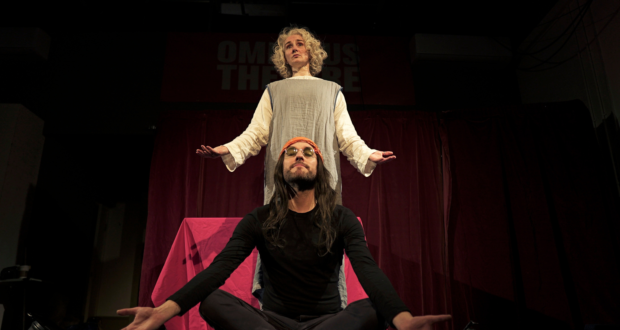A dark comedy infused with Catholic guilt and generational trauma. Summary
Rating
Ok
If you Google ‘Pinot Princess’, you’ll find information about this play, but also about a rare intergeneric hybrid orchid described as ‘pretty with several dark-coloured flowers’. The same could be said of this performance if you replace ‘pretty’ with ‘funny’, and ‘flowers’ with ‘traumas’.
The main character, known as both ‘Pinot’ and ‘Mary’ (played by Pamela Flanagan), attempts to heal her generational wounds by writing and performing a piece about the ‘real’ Virgin Mary. Pinot herself faces a myriad of challenges: Catholic guilt, alcoholism, and a healthy dose of mother-based attachment issues. All of this, alongside her attempts to put on a financially viable performance, creates a 60-minute whirlwind of scenes that leave the audience unsure of what Pinot actually gains by the end. Has her play helped exorcise her demons, or would she be better off seeing a good therapist? Despite the play being named The Pinot Princess, Pinot’s use of alcohol does not come across as her main issue; instead, it is her Catholic guilt and relationship with her mother that come to the fore.
The play within the play is designed to shock and, at times, leaves the audience deeply uncomfortable as both actors approach them aggressively with direct rhetorical questions and slut-shaming insults. The traverse staging works well here, and having two ‘stages’ at each end visually splits the scenes where Pinot and Joe (played by Neal Craig) are in character and not.
Craig’s portrayal of Joe provides light relief to the misery evoked by Pinot. As Pinot’s mental health slowly declines during the run of her play, Joe is left to salvage the situation by coming up with increasingly more outrageous improvisations. His turn as a hippie Jesus is entertaining, and the moment where he breaks into a full Dirty Dancing routine is hilarious, helping to break the tension. Lizzie Mounter provides the voice of social media influencer Emilia Chesterfield and nails the lyrical, drawn-out tone that is so popular with social media stars today, attacking Pinot with the aggression of Emily Maitlis interviewing Prince Andrew. This scene is a slow-motion car crash, written with both humour and horror, and shows how anything can be manipulated on social media.
The set design is effective; the audience seemed to particularly enjoy the ‘altar’ setup with bottles of wine used as candle holders. Sound and lighting also help to bring the scenes to life and differentiate between on and off-stage moments. There are some abrupt moments in the sound design, but this appeared to be more of an error than part of the play.
While there are some very effective moments, the play focuses on too many issues for any of them to be explored deeply enough to provide a satisfying conclusion. Removing references to some would perhaps help Pinot’s character, and the audience, find some closure.
Written by: Lorraine Mullaney
Directed by: Deirdre Daly
Set design by: Phyllida Hicklish, Frankie Vicente and Deirdre Daly
Sound design by: Lizzie Mounter
Produced by: Deirdre Daly and Lorraine Mullaney for Unclouded Moon Productions
The Pinot Princess plays at Omnibus Theatre until 14 April. Further informtion and bookings here.
 Everything Theatre Reviews, interviews and news for theatre lovers, London and beyond
Everything Theatre Reviews, interviews and news for theatre lovers, London and beyond



